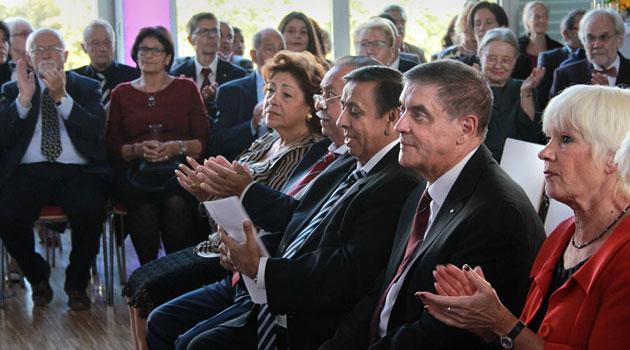Romani Rose tells German Chancellor his parents, who survived the Holocaust, would have approved of her

At the end of September the Central Council of German Sinti and Roma, with the support of various foundations and the German Government, celebrated the 70th birthday of its longtime president, Romani Rose, in Berlin. German Chancellor Angela Merkel of the Christian Democratic Union gave a speech during the celebration, and Rose also received congratulations in person from Prime Minister Bodo Ramelow (Die Linke) of the state of Thuringia, MP Claudia Roth (Greens), who is the vice-chair of the Bundestag, and Hartmut Koschik of the Christian Socialist Union, the Government’s rapporteur for national minorities.
The day-long event included performances by eminent Romani musicians from all over Europe, such as the Roma und Sinti Philharmoniker, conducted by Riccardo Sahiti. Merkel said in her speech that the fight against antigypsyism, antisemitism and right-wing extremism is a significant priority for her.
“Behind each of these concepts lie ideas, words and – unfortunately too frequently – also deeds that are contemptuous of other human beings. In Germany, these ideas are resonating to a degree that is horrifying. However, it would be absolutely erroneous to just turn our backs in disgust. On the contrary, it is necessary to keep our eyes open and to watch this closely. We must not be quiet when the alarm should be raised. We must thoroughly use the means provided by the rule of law wherever it is necessary to prosecute relevant matters from a criminal law perspective. First and foremost, however, it is necessary to raise awareness and to prevent and prohibit the seeds of antigypsyist and racist ideas from sprouting,” the Chancellor said.
Later in her remarks the Chancellor directly quoted the words of Romani Rose: “At first glance this racism appears to be directed against our minority. However, it is, in fact, a stance against our democracy and our democratic values.”
“Thank you,” Merkel said to Mr Rose. “You are right.”
The Chancellor also commented on the negative response to refugee reception in Germany. “These are mechanisms for defining, excluding and rejecting all that appears foreign, mechanisms that weaken our social cohesion, indeed, that even threaten it, and yes – as a recent report on the state of Germany unity has found – these are mechanisms that ultimately will have a negative effect on the economic development of our country,” she said.
Romani Rose responded to the Chancellor’s words by expressing appreciation for her bravery as follows: “My parents, who survived the Holocaust, would have been glad if back then there had been a woman in Europe with your courage and your backbone. You have always defended the values of our state with an awareness of the experiences of Germany history, and you have also protected those values in the case of the powerless people who are fleeing terror and war and who have been left without aid. You did not want to accept 60 million people, I know. You wanted to send a signal to the European Union. At the time you were very much alone. Our wish is that more European colleagues will join you.”
Milestones in the life of Romani Rose
Romani Rose’s grandparents ran a travelling cinema in what was then German Silesia. Together with 11 of their relatives, they were murdered by the Nazis at Auschwitz.
Rose was born in 1946 in the in Heidelberg. His father, Oskar, had visited the then-Cardinal of Munich, Michael Fauhaber, in 1943 with a request for an audience in order to attempt to persuade him to prevent the deportation of Romani people to Auschwitz.
The Cardinal refused to receive him. Immediately after the end of the war, Oskar Rose and his brother Vincenz began to engage in the question of Romani equality.
In 1948 the brothers established the “Union and interest association of racially persecuted German citizens of non-Jewish faith”. When they saw that their Nazi persecutors were continuing to serve in their original functions and to practice their professions after the war, in July 1948 they filed a criminal report against Robert Ritter, the former leader of the Nazi “Racial Hygiene Research Institute” and against others who had organized and performed an inventory and survey of German Roma.
The fact that Ritter was never criminally prosecuted and died without being held responsible for his actions left its mark on Rose and his entire generation. In 1952, the German Government agreed with representatives of the Israeli Government on the terms of compensating the surviving Jewish victims of Nazism.
That same idea was rejected in relation to the Romani victims of Nazism by the German Supreme Court in 1956 by means of a verdict that said the following: “Gypsies have tendencies to criminality and fraudulent activities. They lack the moral instinct of respecting the property of others because, like primitive cavemen, they have an unlimited desire to occupy it themselves.”
In 1979, Romani Rose was elected chair of the “Union of German Sinti”. When the state of Bavaria perpetually refused to allow him to view the files of the police’s “Central Registry of Travellers”, which was continuing to keep an inventory of German Roma across the board and still used the numbers that had been forcibly tatooed onto the arms of prisoners at Auschwitz to identify them in the postwar records, Rose co-organized, with the participation of the surviving victims of the Holocaust, a hunger strike at the memorial to the former concentration camp of Dachau near Munich.
That action was supported, for example, by the American violinist Yehudi Menuhin and the Russian-born Romani actor Yul Brynner and resounded worldwide. According to Merkel, it was precisely that hunger strike that was the “breaking point” for the issue of Roma and Sinti recognition.
In 1982, then-West German Chancellor Helmut Schmidt received a delegation of German Sinti and for the first time acknowledged the crimes the Nazis committed against Romani people as genocide. The Romani victims of the Nazis were then able to apply for financial compensation.
In 1991, Rose took over the leadership of the newly-built “Documentary Center of German Sinti and Roma” in Heidelberg, where the first permanent exhibition about the Holocaust of the Roma during the Nazi era was created. Last year, the center opened a branch in the capital, and that is where Rose celebrated his birthday at the end of September this year.
In 1997, the Roma and Sinti were recognized by the German Government as a national minority for the first time ever. In 2001, Rose opened a permanent exhibition about the Romani victims of the Holocaust at the Auschwitz-Birkenau State Museum, an exhibition that is second to none in terms of its documentary depth and scope.
In 2012, the German Federal President opened a newly-constructed monument to the murdered Roma in Berlin. It was not until this year that the German Supreme Court apologized for its 1956 verdict.
Rose had the following to say about his decades-long fight for equality: “Romani people today are no longer just a footnote. This is about the younger generation. It’s also about our common responsibility to learn from history, with the purpose of building a democratic society.”
In terms of the degree to which Romani people face enormous obstacles to their attempts to join society even today, Rose is of the opinion that “At first glance this racism appears to be directed against our minority. However, it is, in fact, a stand against our democracy and our democratic values.”
The German daily Süddeutsche Zeitung reported on the occasion of Rose’s birthday that he, too, is horrified by today’s terrorist attacks and by the way the world is becoming disassociated. “He thinks beyond that, though: How will the populists abuse that violence? Will a new racism grow in the soil of this fear? That is why he fights so vehemently for the solidarity of a democratic, open society,” the paper has written.
